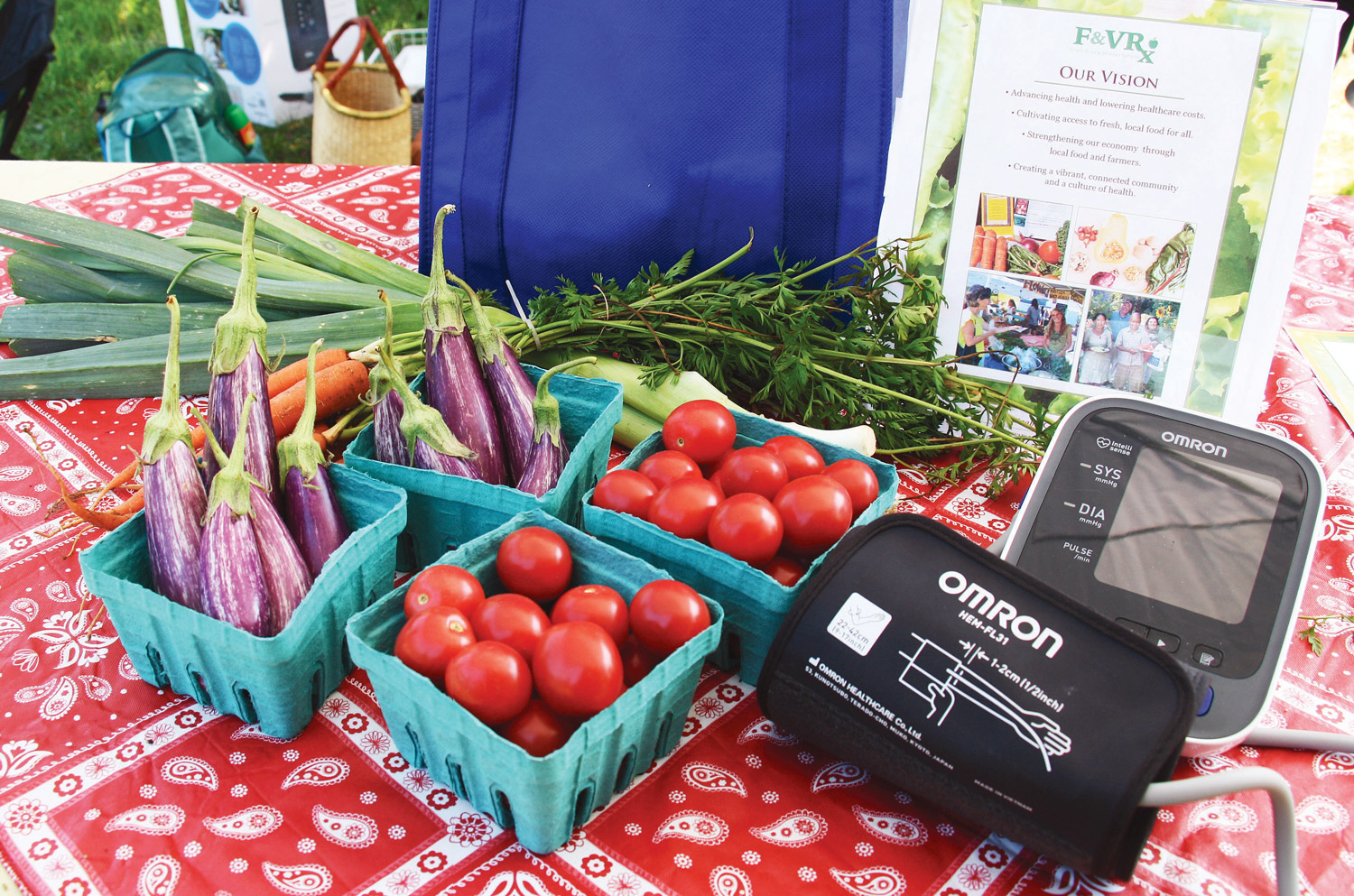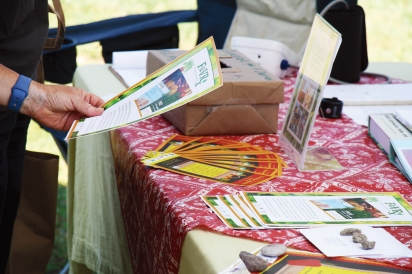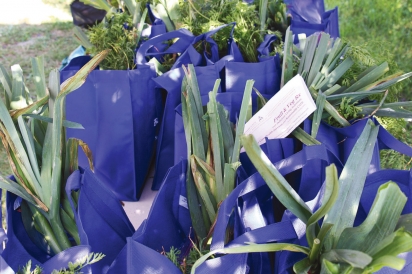Doctors’ Orders: Eat Your Fruits and Veggies
When doctors advise patients to eat their fresh fruits and vegetables, it is usually a recommendation, delivered more emphatically at some times than others. This summer, when Outer Cape Health Services (OCHS) physicians advised some patients to eat fruits and vegetables, it could be a prescription, bolstered by weekly CSA-type bags from the Truro Farmers’ Market. This was thanks to the Fruit & Vegetable Prescription Program, a joint effort by Sustainable CAPE and Outer Cape Health Services, aimed at improving the health of seniors diagnosed with cardiometabolic disease by giving them $20 of free fruits and vegetables every week for 12 weeks.
“Increased intake of fruits and vegetables decreases many causes of mortality,” explained Francie Randolph, founding director of Sustainable CAPE, which manages the Truro and Provincetown Farmers’ Markets. Participants, who were referred by their OCHS physicians, had to be 65 or older; covered by Medicare and Medicaid; and have heart disease, diabetes and/or hypertension — conditions “that would be helped through a shift in nutrition,” explained Leo Blandford, OCHS director of community-based coordinated care. “The idea is if patients are coming in with [certain] medical diagnoses, in addition to what a primary care physician might be utilizing for treatment, this food prescription would be a supplement.”
Randolph, who is on the steering committee of Food Is Medicine Massachusetts at Harvard Law School and is working on future sustainability for produce prescription programs across the state, began discussing plans for a local program with Blandford and Meredith Goff, former OCHS director of nursing, two years ago. The three met weekly — mostly remotely once COVID struck — to bring it to fruition. Goff and Randolph wrote a grant proposal that they submitted to Cape Cod Healthcare in September 2020, with OCHS as a partner. They received partial funding for a 12-week pilot later in the fall and have been seeking to raise additional funds. “Our goal is to make our program sustainable so it is an integral part of Outer Cape Health and Sustainable CAPE,” Goff noted.
“If we are looking at local opportunities, this partnership with Sustainable CAPE and OCHS is a reflection of a bigger picture of what is going on in the state,” said Blandford. “The state is also looking at, ‘How can food be medicine?’” Research cited by Food Is Medicine Massachusetts has shown that over a lifetime nutritious food referral programs like the Fruit & Vegetable Prescription Program can substantially prevent cardiovascular disease events, add quality-adjusted life years and save tens of billions of dollars in health care costs nationally.
Because the Fruit & Vegetable Prescription Program was a pilot, this summer it was limited to 21 patients. They ranged in age from 65 to 92 and live in towns served by OCHS (Provincetown to Yarmouth). Program staff measured patients’ blood pressure and A1C levels (an indication of diabetes) at the beginning of the pilot and again at the end to determine whether there were any changes. Patients could also get their blood pressure checked at a Hub for Health tent at the Truro Farmers’ Market, as could all market visitors. “The tent offers not only a health check but a positive greeting and social interaction,” Randolph wrote in an email.
An earlier vegetable prescription program that Sustainable CAPE ran with Emerald Physicians in 2016 and 2017 also measured patients’ biomarkers. The more recent pilot went a step further, also measuring whether, and how well, it improved participants’ mental health and happiness. The program staff distributed a questionnaire at the beginning of the program containing a standard medical set of questions to assess social isolation and loneliness. They collected the questionnaires when the program wrapped. “I believe this is one of the first vegetable prescription programs in the country that is measuring a mental health benefit as opposed to just physical health,” Randolph said. “I believe when you plug into your local food system, and you’re going to the farmers’ markets and you have these relationships and you’re buying and eating this food, that it improves not only your physical health but your mental well-being.”
Jayde Dilks, Sustainable CAPE program coordinator, worked directly with patients since the enrollment period began. She and Brianne Smith, a patient navigator at OCHS, began by phoning eligible residents to see if they were interested in joining. Dilks helped those who needed it with the paperwork required to enroll, visiting them at home when necessary.
Patients who were able to, picked up their produce in CSA-style bags every Monday at the Truro Farmers’ Market. “There’s an eagerness to get locally-sourced food,” Blandford noted. “The fact that it’s healthy is a win-win situation. If there is a hesitancy, it depends on which town people are living in. Driving a far distance can be a deterrent.”
“Transportation is an enormous factor in food access issues,” Randolph added, so Dilks delivered the bags to anyone who couldn’t get to the market for any reason. The number of participants receiving delivery varied from week to week. When she dropped off the produce, Dilks always spent time chatting with the recipients, reviewing both ingredients in the bag and the newsletter that local nutritionist Nicole Cormier, RD, LDN, wrote every week. The drop-offs were “a nice social practice for them as well,” she said.
Every week Sustainable CAPE’s Jess Cook contacted farmers to see what they had available, then consulted with Cormier to determine which five ingredients would go in the bags. In addition to the Truro Farmers’ Market vendors, produce came from the Provincetown Farmers’ Market and the Chatham Bars Inn Farm, where a Sustainable CAPE intern was working. Dilks collected the food and bagged it for the patients every Monday morning. Cormier’s newsletter explained the health benefits of a featured ingredient in each week’s bag, and included cooking tips and recipes that incorporate all of the items in the bag. Each issue also contained a list of foods with protein and fiber that could be combined to create well-balanced meals.
Integral to the program were five cooking classes, created and led by Cormier. These took place at the Truro Public Library immediately following the market. The classes taught participants “how to put together nutritionally-balanced meals using locally-grown ingredients,” Cormier explained. She focused on meals and skills that addressed participants’ specific comorbidities. The classes ended with lunch. “Whatever we made we served,” Cormier said.
“This is an older population,” emphasized Goff. “They may not really be familiar with the farmers’ market concept. A lot of the people are uncertain or don’t necessarily know how to cook and store produce. They might be intimidated. Providing support that helps people actually utilize what they’re being given is a big emphasis of the program.” She added that a cooking class with lunch is not just a teaching opportunity but a chance to socialize as well.
One woman told Dilks that just before the first class she went to bed and woke up “really excited”. “It’s a really nice feeling to watch these folks with multiple health issues getting so excited about something as simple as fruits and vegetables and just learning about what they can do for themselves,” she said.
Other participants weighed in on particular ingredients that they enjoyed. “In the first week I had a lot of feedback on both the rhubarb and mushrooms [two items in the bag],” Dilks said. One woman emailed:
I am most grateful for this opportunity to shake up and diversify my diet…I have always wondered about mushrooms, and not being a particular fan, I had never tried one. They were so delicious. I just sauteed in butter. That was the ticket.
Mushroom cultivator Uli Winslow, founder of Cape Coastal Products in Truro, loved feedback like that. His oyster, shiitake and lion’s mane varieties are often included in the produce bags. In addition to being delicious, mushrooms offer a wealth of health benefits. Winslow, noting half tongue-in-cheek that “Mushrooms are the new kale,” explained that oyster mushrooms have tremendous anti-inflammatory properties along with all nine amino acids and B vitamins. Shiitakes help balance the immune system and absorb Vitamin D, an important element many of us in New England are short on. Lion’s mane, which he said “looks like a piece of coral,” is beneficial for those with memory loss.
Before the market opened, Randolph notified all the participating farmers that Sustainable CAPE would be purchasing roughly $400-$600 worth of food per week just for the Fruit & Vegetable Prescription Program. Winslow tried to increase his production accordingly. “Any time I can benefit the community in that way, I do,” said the Outer Cape producer.
The program “incentivizes a person to choose healthy nutrition,” explained Randolph. Coordinators introduced patients slowly to foods with which they may not have been as familiar. As the season changed, the produce participants received changed, too. And when the 12-week pilot ended in early September, participants were able to segue into the state’s Healthy Incentives Program, which refunds money to people’s SNAP cards when they use them to buy local fruits and vegetables from HIP-approved farm vendors. All Truro and Provincetown farmers’ market vendors are HIP-approved.
Goff said an initiative like the Fruit & Vegetable Prescription Program is important because, “Most small medical providers talk to their patients about nutrition but it tends to be in a very perfunctory way because visits are quick and there are a lot of other things that need to get discussed. Diet gets put off to the side. By giving people a prescription, I think that is a powerful act that says, ‘We think having you eat a healthy diet is equally important as taking your medicine and getting enough exercise.’”
“If we have the ability to pay attention to what we are putting into our bodies, over the long run we find that it really makes a big difference,” added Blandford. “If what we are putting into our bodies is coming from locally sourced food, what a gift that is.”






